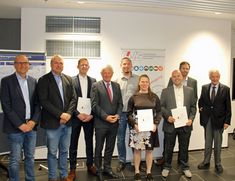Peter-Faller Award goes to Klaus-Dieter Rest
At the award ceremony of the Peter-Faller Award on 20 October, Klaus-Dieter Rest was honoured for his cumulative dissertation, which he completed in 2021 at the Institute of Production and Logistics (PWL).
The Austrian Society for Traffic and Transport Science (Österreichische Verkehrswissenschaftliche Gesellschaft, ÖVG) awards the Peter-Faller Award for outstanding scientific master and doctoral theses in the field of Transport - Traffic - Logistics. The award was established upon the farewell of em.Univ.Prof. Dr. Peter Faller as long-time president of the ÖVG and honours his services to the ÖVG as well as his sustainable achievements in research and teaching.
In the award-winning dissertation, Klaus-Dieter Rest focuses on home health care services that enable elderly and frail people to live a self-determined life in their familiar homes. He worked on optimising the deployment and routing of home health care services, both in day-to-day business and in the event of a disaster. To gain insights into the complex system of home health care and to analyse the effects of various disasters, he conducted risk analyses. He visualised selected disasters (epidemics, power outages, heat waves and floods) with causal loop diagrams to show their cascading effects and feedback loops.
To support the daily planning of home health care nurses, during both daily business and in times of disasters, a new mixed integer linear program as well as several Tabu Search metaheuristics have been developed. While previous research is limited to rural areas, the focus of this thesis is on urban areas. The published algorithms are based on the requirements of two major HHC service providers in Vienna and cover a wide range of aspects of the daily routing of HHC nurses. It contains several working time regulations, flexible breaks, constraints regarding consistency of care, workload distribution, and synchronization. The use of time-dependent public transportation is still a unique feature.
The developed decision support system is very flexible in terms of its constraints and objective function, so that planning can be adapted to the needs and preferences of the dispatchers. Extensive numerical studies with real-world data showed significant savings, not only in travel and waiting times, but also in the number of second shifts. Scenario analyses were conducted to determine the limits of operational capability in the event of a disaster. In addition, the effects of using different modes of transport on planning are shown.
The publications relevant to the dissertation as well as further research contributions by Klaus-Dieter Rest can be found here.

